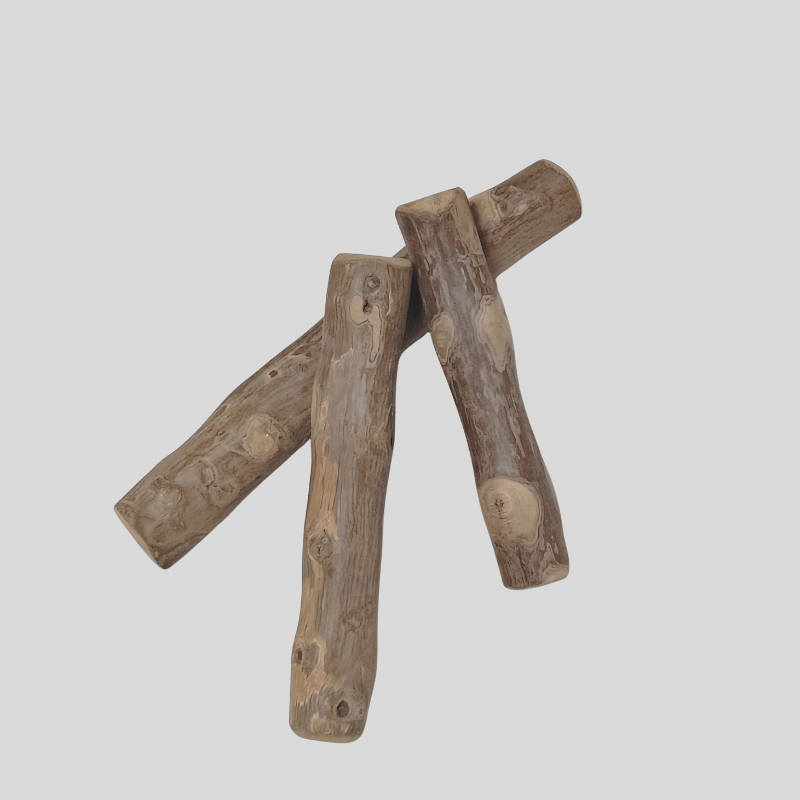Few things in dog ownership are as rewarding as watching your pup happily chewing away. It’s pure bliss to see that focused expression, wagging tail, and contented sigh. But beyond the joy, many owners wonder: Which chews are actually good for dogs? With so many options—rawhide, rubber toys, bully sticks, even bones—the choice can feel overwhelming.
You’re not just buying a toy; you’re buying a tool that can help clean your dog’s teeth, strengthen their gums, and keep them safe. Let’s take a closer look at what makes a great dental chew, and why so many pet parents are turning to coffee wood dog chews as a natural alternative.
What Makes a Chew “Good” for Teeth?
Not all dental chews are the same. The best ones share a few key qualities:
- Effective Plaque Removal: The chew’s texture should help remove plaque and tartar, acting like a natural toothbrush.
- Safe Density: It should be durable enough to last, but not so hard that it cracks teeth. A good rule of thumb: if you wouldn’t want it knocked against your kneecap, it’s too hard.
- Digestibility: Edible chews should be made from simple, easily digestible ingredients. Non-edible chews, like wood or rubber, should be non-toxic and fray safely rather than splinter.
- Low in Calories, No Additives: Many treats contain excess fat, preservatives, or calories. The best chews are simple, natural, and safe.
Comparing the Most Common Chew Options
- Rubber Chew Toys: Excellent for durability and mental stimulation. They don’t scrape plaque as effectively, but filling them with frozen treats or dog toothpaste can help.
- Rawhide: A classic but controversial choice. Low-quality rawhide can splinter, swell in the stomach, and may contain harsh chemicals. Always supervise if you choose this option.
- Bully Sticks: Highly digestible and protein-rich. They can help scrape teeth, but they’re calorie-dense and fully edible, so moderation is important.
- Antlers & Bones: Long-lasting but risky. Their rock-hard texture often leads to cracked teeth and costly vet visits.
So, is there a chew that balances effectiveness, safety, and simplicity? Yes—coffee wood dog chews.
Why Coffee Wood Dog Chews Are a Popular Choice
Imagine your dog’s love for sticks, but without the dirt, splinters, or danger. That’s the beauty of coffee wood chews. Here’s why they’re becoming so popular:
- Perfect Texture for Dental Health: Coffee wood is dense and fibrous. As dogs chew, it frays into soft, brush-like fibers that massage the gums and help remove plaque.
- Tough but Tooth-Friendly: Harder than nylon but softer than antlers, coffee wood satisfies strong chewers without the high risk of fractured teeth.
- 100% Natural and Sustainable: Made from the core of coffee plants after beans are harvested, these chews are eco-friendly and contain no chemicals, caffeine, or additives.
- Low-Calorie and Hypoallergenic: A safe choice for dogs with allergies or those watching their weight. Endless chewing, zero extra calories.
Choosing the Right Chew for Your Dog
- Power Chewers: A dense coffee wood chew or heavy-duty rubber toy is best.
- Moderate Chewers: Bully sticks or softer chews can work with supervision.
- Puppies: Softer rubber toys help soothe sore gums before transitioning to firmer options.
Whatever you choose, always supervise your dog and replace the chew once it becomes too small to be safe.
Final Thoughts
Your dog’s dental health is an important part of their overall well-being. While brushing and regular vet visits are essential, the right chew can act like a natural toothbrush your dog actually enjoys.
If you’re looking for an option that’s safe, natural, and effective, coffee wood dog chews are a fantastic choice. They keep tails wagging, teeth clean, and smiles bright.

